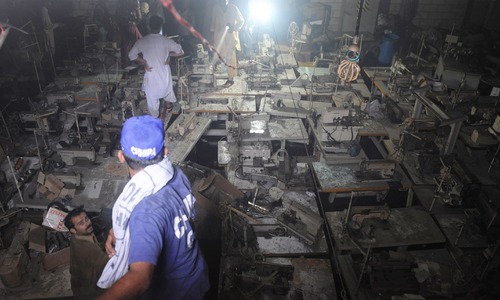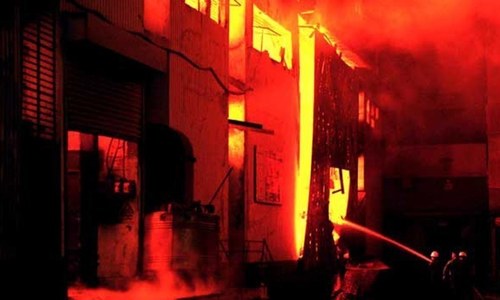KARACHI: The police and Rangers have failed to bring back to Pakistan the fleeing owners of the Baldia factory and the alleged mastermind of the deadly fire that killed some 260 workers though the trial has entered its seventh year, it emerged on Wednesday.
More than 260 workers were burnt alive in the multistorey building of the Ali Enterprises garment factory on Sept 11, 2012.
Seventeen charred bodies recovered from the burnt industrial unit are still unidentified.
ATC bound to decide a case within seven days
Nine accused — including Muttahida Qaumi Movement lawmaker and then provincial minister for commerce and industries Rauf Siddiqui, then MQM sector-in-charge Abdul Rehman, alias Bhola; Zubair, alias Chariya — have been charged with allegedly setting ablaze the ill-fated industrial unit with the help of its four gatekeepers — Shahrukh, Fazal Ahmed, Arshad Mehmood and Ali Mohammad.
Read: Quiet burns the fire: The Baldia tragedy
The prosecution alleged that they acted on the instruction of the then head of the MQM’s Karachi Tanzeemi Committee, Hammad Siddiqui, as the factory owners failed to pay Rs250 million protection money and partnership in the business.
Hyderabad-based business persons — Umar Hasan Qadri, Ali Hasan Qadri, Dr Abdul Sattar Khan and Iqbal Adeeb Khanum — have been booked for purportedly using Rs50.9m allegedly extorted from the factory owners on the pretext of compensation for the victims.
The antiterrorism court-VII judge, who is conducting the trial at the judicial complex inside the central prison, had framed the charges of terrorism, extortion and arson on the accused persons on Feb 14, 2018. But they pleaded not guilty and opted to contest the case.
“Currently, two accused persons — Bhola and Chariya — are in jail,” Advocate Sajid Mehboob Sheikh, special public prosecutor representing the Rangers which became the prosecuting agency in the case after the charges of terrorism, extortion and murder were added, told Dawn.
Seven other accused persons, including Rauf Siddiqui, the Hyderabad-based business persons and the four gatekeepers of Ali Enterprises, are on bail, he added.
The judicial and prosecution sources said Hammad Siddiqui, the alleged mastermind, and Ali Hasan Qadri had been declared proclaimed offenders in the present case.
No follow-up to Hammad’s arrest in Dubai
“Hammad is still out of the country,” the prosecution sources explained, adding that the media reports regarding his arrest in Dubai through Interpol “could not be confirmed” due to which the process to bring him back to the country was not initiated.
“Qadri went to America for cancer treatment after obtaining bail from the trial court and he is said to be unable to travel back due to his worsening health condition,” they added.
Initially, owner of the factory Abdul Aziz Bhaila and his two sons, Arshad Bhaila and Shahid Bhaila, a general manager and four gatekeepers were charge-sheeted by the police for allegedly committing premeditated murder and ‘negligence’ to the workers’ safety.
However, the case took a new turn in February 2015 when Pakistan Rangers, Sindh, submitted a joint investigation team (JIT) report in the Sindh High Court (SHC), which revealed that the factory was set on fire after its owners failed to pay ‘protection money’.
Subsequently, the reinvestigation of the case was ordered in March 2015 through a JIT. In the meantime, the SHC directed the ATC to expedite the trial and submit a progress report on every hearing.
“Earlier, the police had almost buried the case due to political exigencies,” the paramilitary force’s prosecutor said, adding that the matter was being used as a political tool between the then ruling political parties.
ATC bound to decide a case within seven days
An antiterrorism court is legally bound to decide a case within seven days after indictment, according to Section 19(7) of the Anti-Terrorism Act.
However, after a lengthy reinvestigation, the police filed a supplementary investigation report in August 2016 in which they only charge-sheeted Hammad Siddiqui, Bhola and their three to four unknown accomplices and did not send the 13 other suspects, including those proposed by the JIT, for trial.
But the court had put all discharged men in the list of the accused by observing that the owners/manager had ordered the closure of the gates while others abetted the crime one way or another by extorting money on the pretext of distributing it among the victim families.
Later, the court recalled its order regarding the inclusion of the owners as accused as the prosecution said they were the key witnesses in the case.
The prosecution listed 768 witnesses in the supplementary charge sheet.
“Six witnesses, four doctors and two police officials, have died a natural death during this period,” the prosecution and judicial sources told Dawn.
The remaining witnesses included over 300 private persons, 259 legal heirs of the victims and 56 survivors.
The Rangers prosecutor said that they gave up 364 witnesses being “unnecessarily” listed in the present case.
“So far, the testimonies of 396 witnesses have been recorded,” he said, adding that they included the eyewitnesses, legal heirs, the injured, chemical examiners and forensic experts.
The prosecution claimed that seven witnesses — factory owners Arshad Bhaila and Shahid Bhaila, three police investigating officers and two chemical and ballistics experts of the army — are left to be examined now.
“We are preparing to get the statements of the factory owners — Arshad Bhaila and Shahid Bhaila — recorded through video-conferencing system from the Pakistan consulate in Dubai, United Arab Emirates,” said prosecutor Mehboob on whose request the trial court had last month directed the federal government to ensure that necessary arrangements were made at the foreign mission’s office in the Gulf state.
The Bhaila brothers with their father, Abdul Aziz Bhaila, were initially booked and arrested in a case pertaining to allegedly committing premeditated murder and negligence towards the workers’ safety at the workplace, etc.
In February 2013, they were granted bail by the Sindh High Court as the IO recommended dropping the charge of premeditated murder in the case. However, after obtaining post-arrest bail, they fled the country citing alleged death threats. In 2015, a joint investigation team probing the case met them in Dubai and recorded their statements.
On the last hearing, the trial court deferred recording their testimonies through video link after accused Rehman, alias Bhola, challenged such a move in the SHC, which is yet to rule on the matter.
Published in Dawn, September 12th, 2019














































